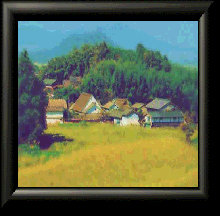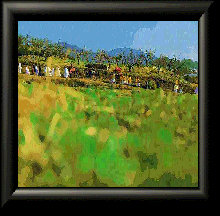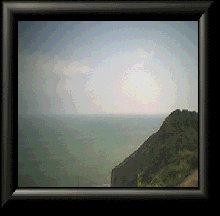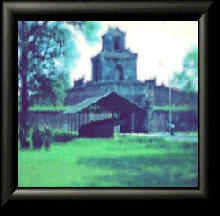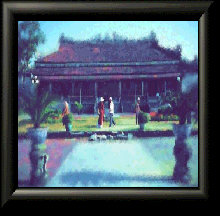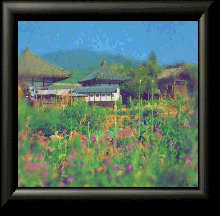
(p16) The Chapter
3 New Nippurland 6
In BC 2275 years, Ravana and the heavenly
posterity tribe went east by ship by guidance of the messenger of
Dhy Wuh.
They passed through Taiwan Haixia from South China
Sea, and reached Tokoyoland of the Mt. Fuji foot.
In Tokoyoland,
the Hiko was called Arahabaki (the present holy emperor).
The Arahabaki welcomed Ravana from afar and approved the status
of the Sumeramiko formally.
The Arahabaki was anxious about
Okinawa which is ancestral territory being put under an uncivilized
tribe's rule.
He permitted the Okinawa possession on the
conditions that a Sumeramiko becomes the subject of Arahabaki.
Ravana was not interested in the small island of the south.
He was not interested in the talk.
However, it was
not wise to have hurt feelings of the Arahabaki.
Old retainers
also advised.
"Let's get unreservedly what is given."
Then, he decided to get territory.
Ravana appointed
the cousinly Omodal as the Okinawa king.
He could make
30 percent of the Heavenly posterity tribe able to accompany Omodal,
and sent into Okinawa.
All of supply of warships, goods,
and laborers were performed by assistance of Tokoyoland.
The Okinawa islands had recovered remarkable land by sea surface
retreat.
The Jomon people and the sea people of the Murray
descent who have crossed the Satsunan islands lived in the island.
They are performing the primitive colony and were performing
a fishing, a collection, and root-vegetables agriculture.
In the greatest Okinawa island in islands, aborigines looked out
to the Omodal party who landed.
They were the aspects which
establish a battle.
Omodal established the imperial castle
in the foot-of-a-mountain part of the Ishigaki island which had
small population.
He made that try main island conquest
in a position.
In BC 2274 years, Ravana who left Tokoyoland
took the warship of the Hsia dynasty, and he crossed the Yellow
Sea.
They ascended the Yellow River and reached Kaifeng
which is the capital of the Hsia dynasty.
King Wuh also
welcomed Ravana.
He considered that the status of the Sumeramiko
of Ravana and the status of the Dhy of Wuh were the same ranks.
They connected the pledge of a brother-in-law.
It
was the medical technology which Dhy Wuh anticipated to theHheavenly
posterity tribe.
The China continent had racial active
exchange.
In addition to it, the moist climate brought
evil on this continent.
The whole region was polluted by
the endemic disease and the infectious disease.
Moreover,
the damage of a flood was also severe.
A death due to sickness
of a worker was a still serious problem.
Of course, suckling
mortality rate was also extremely high.
They were told
to be fortunate, when three persons turned into becoming an adult,
even though the married couple made ten children.
The medical
supplies of Tokoyoland were the object of envy also not only for
the Hsia dynasty but for other countries in China.
The medicine level of Haraland did not amount to Tokoyoland at allr.
Haraland envoy's greatest purpose was supply of medical supplies.
Those days by Tokoyoland, the process of an antibiotic was
handed down.
They were not invaded by bacterias.
Therefore, their life was remarkably long compared with circumference
countries.
Tokoyoland regarded medical supplies as important
strategic goods.
They exported it at the expensive price.
But they resisted the outflow about the process.
By
obtaining an obligation to the Heavenly posterity tribe, Dhy Wuh
aimed at revival of the medical technology of the tradition which
has stopped since Dhy Hwang.
"I may also be able to
receive the process of the antibiotic which is the medicine of perpetual
youth and longevity."
He anticipated so.
Especially agriculture and medicine were respected by Chineses among
the technology which the Heavenly posterity tribe carried in.
The heavenly posterity tribe had lost the process of an antibiotic.
But, they were developing the antibacterial agent by mercury
and sulfur.
This medicine was called "Kimtan (the
golden secret medicine)", and was respected in China.
The agricultural engineer of the Heavenly posterity tribe came to
be called Jinno, and was respected from the farmer of Hsia more
than Ravana who is a Sumeramiko.
Dhy Wuh gave the territory
of the Taishan circumference to Ravana, and revived the Nippurland.
Ravana built the imperial castle to Qufu and was taken as the
Yamato city.
Ravana was hidden in BC2265.
Dhy
Wuh sent the title "Taishan Saint" to Ravana, and deified
his spirit of the dead to Taishan.
The Hsia dynasty lengthened
the version figure at the Yangtze River valley.
The form
of the Hsia dynasty was the aggregate of a city state.
When put in BC1700 period, the nomadic people has resided permanently
in the Yellow River valley, and nation called Inn was made.
Inn was subordinate to the Hsia dynasty in the born beginning.
However, while they absorbed the culture, they lengthened the
range of influence in south area gradually.
They began
to invade the territory of the Hsia dynasty military at last.
When BC1400 period came, Inn governed China territory other
than the Yellow River down-stream region.
The Inn dynasty
was a high-handed absolute state to the Hsia dynasty which had taken
a comparatively tolerant policy.
The conquered race was
made into the slave.
Since the Yamato city circumference
was surrounded by the plain in the four quarters, the defense was
difficult.
It was disadvantageous that they confronted
the Inn dynasty with huge military power.
The heavenly
posterity tribe was urged for the decision which leaves China again.
